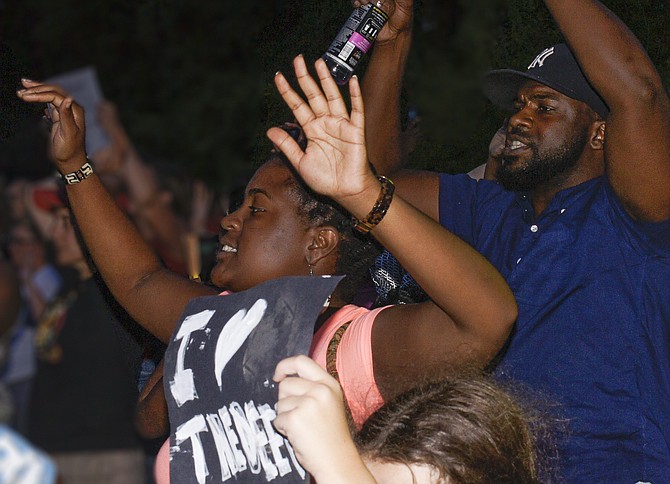The discussion featured community organizer Brittany Gray (center), who was on the ground during recent riots in Ferguson, Mo. Photo by R.L. Nave.
"Until the killing of black men, black mothers' sons, becomes as important to the rest of the country as the killing of a white mother's sons, we who believe in freedom cannot rest until this happens," Ella Baker said of the search for three missing civil-rights workers—James Chaney, who was black, and Andrew Goodman and Michael Schwerner, who were white—during Freedom Summer in 1964.
Fifty years later, Baker's call-to-action remains as true as ever. Recently, Jackson activists along with the Veterans of Mississippi Civil Rights Movement Inc., the Tougaloo College National Association for the Advancement of Colored People and the Gamma Upsilon chapter of Alpha Phi Alpha met at Tougaloo's historic Woodworth Chapel for a panel discussion titled "From Freedom Summer to Ferguson: The Value of Black life in 'Post Racial America.'"
More than 50 years ago, civil-rights activists, including Rev. Dr. Martin Luther King Jr., Robert F. Kennedy and Medgar Evers, spoke inside the historic walls of the Queen Anne-style chapel.
Flanked by an American flag to his left and a Christian flag to his right, Emanuel Williams, Tougaloo's current sophomore class president, moderated the discussion, which featured community organizer Brittany Gray who was on the ground during recent riots in Ferguson, Mo., and C.J. Lawrence, a community organizer who traveled with Gray. During the riots, Lawrence started the hashtag #iftheygunnedmedown that went viral and trended for much of 2014.
Other panelists were criminal defense attorney June Hardwick, Jackson Ward 6 Councilman Tyrone Hendrix, and Rev. Dr. Jerry Young, president of the National Baptist Convention USA
Almost immediately, feelings of anger, the need for instant action and lingering questions came to the forefront as panelists shared their emotions about the rash police killings that took place in 2014. Hendrix acknowledged his family in the crowd and spoke of conversations with his wife, Ercilla, in which they talked about how they should raise their son in a society where the people that are supposed to protect black people kill them.
At times, the tone of the evening mirrored the seriousness of the topics at hand. Inside the dimly lit, wood-paneled chapel, the award-winning Rust College a cappella choir delivered a "rousing performance" to match the "rousing discussion," observed Cynthia Dorsey Smith, a VMCRM board member.
One selection was designed to unite the diverse audience. From the very first lyric of Albert Brumley's "I'll Meet You in the Morning," choir members paraded from the risers in front of gold and ivory organ pipes to greet the audience seated on red-pillowed pews. With smiling faces, they shook hands with every person—young, old, black, and white and sang: "There will be no disappointments and nobody shall die / I'll meet you in the morning with a 'How do you do?'"
Amidst that hopefulness, panel members did not waver in offering sharp critiques of the news media, the idea of post-racial America and the need for new policies. Panelists Gray and Lawrence, who traveled to Ferguson during the onset of the unrest, said their experience there was contrary to what the mainstream media narrative showed.
"There was so much cohesiveness on the ground, and I don't think that was accurately portrayed," Gray said about participating in peaceful marches in August of 2014.
"There was a deeper story told through Facebook, Twitter and Instagram so I encourage people to continue to use those," Lawrence, who handled social media for late Mayor Chokwe Lumumba and Lumumba's son Chokwe Antar, added of the stories from Ferguson.
Rev. Young noted that racism remains a fact of life in America, but in a form that is "a bit more sophisticated."
"It is racism nonetheless," Rev. Young said.
Hardwick, an attorney and former municipal judge, agreed as she recapped the history of African American slaves. "America can't be post-racial. It was built on racism," Hardwick said.
Echoing Rev. Young, Lawrence said racism persists through Mississippi policies on public education.
"When we speak to systematic oppressive issues and policies that we face currently in Mississippi, then we have to speak to the issue of a fully funded education and the fact that that's on the ballot right now," Lawrence said as the audience erupted in applause.
Chip Wells, who is white and the father of two mixed-raced children and lives in Jackson, left the discussion with positive hopes for the future.
"I think this is a step in the right direction," Wells said. "If we open up more dialogue between the races, then things will get better."


